World Peace Forum 2003 in Sydney
The day was a big success for Yoga in Daily Life, especially for the Australian Association of Yoga in Daily Life and for the life-long peace efforts of Swamiji.
The World Peace Forum 2003 was held in a five star auditorium right next to the beautiful Sydney harbour, but in contrast to this beauty was the fact that the world is in a time of much conflict and suffering. Partly because of the stress and uncertainty being felt by Sydneysiders (as well as the enormous amount of promotional work done by the Yoga in Daily Life volunteers!) nearly 800 men, women and children attended the Forum, as well as representatives from most major media.
World Peace Forum 2003
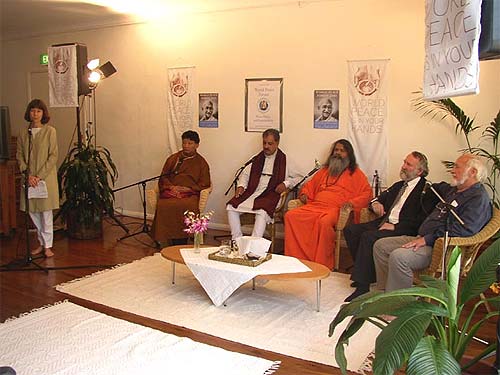
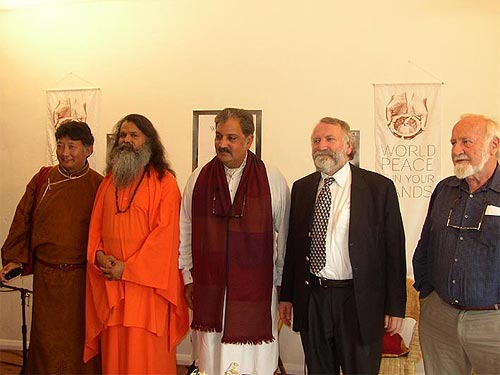
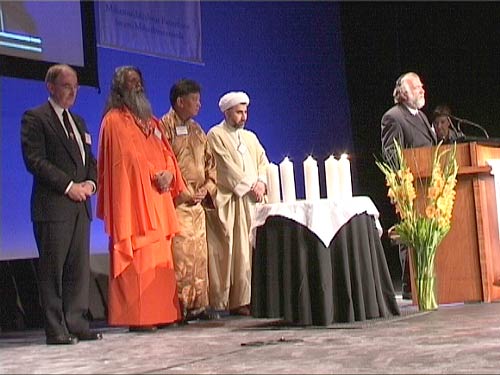
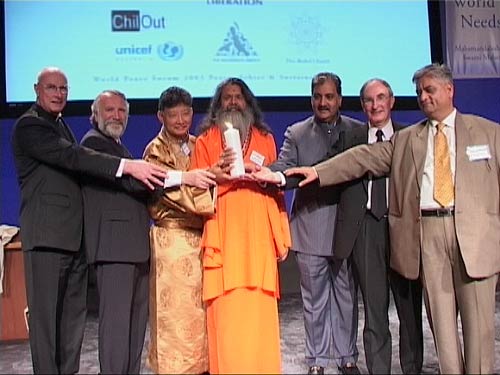
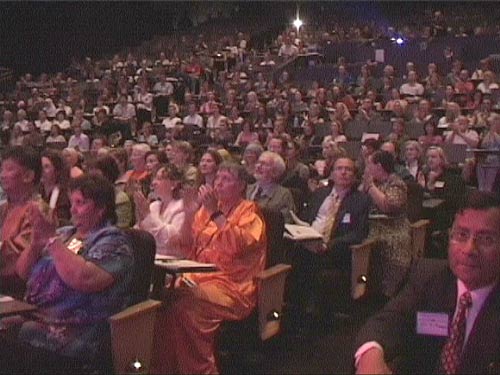
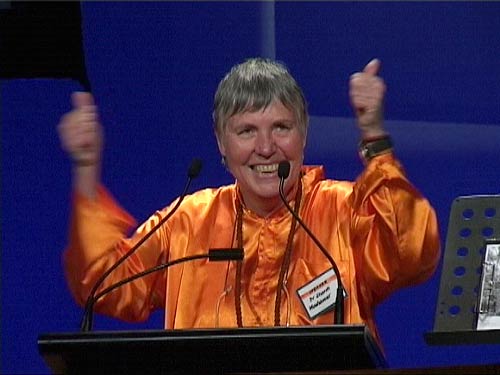
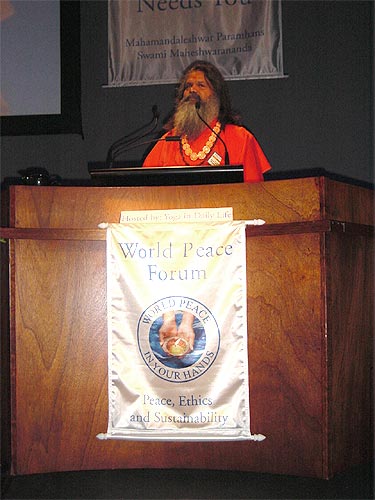
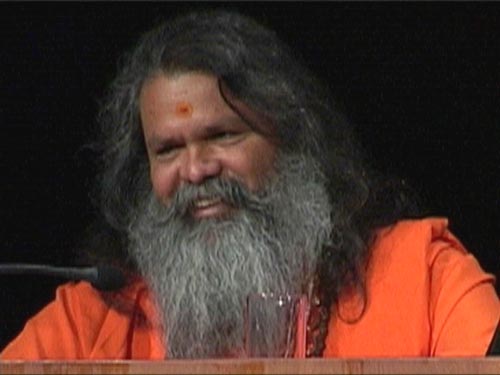
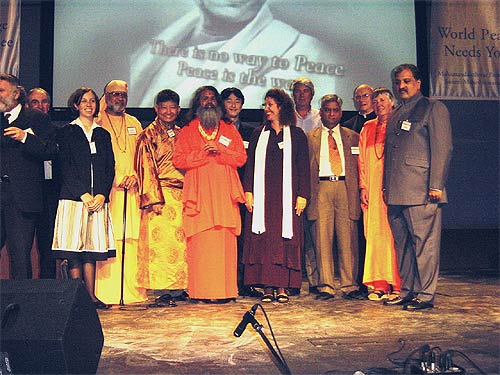
The theme of the forum was Peace, Ethics and Sustainability. Mahatma Gandhi’s message of “Be the change you want to see”, was the main idea running through the day. There were four “Speaker Modules” with four to five speakers per module. In between were some performances from African-American gospel music, Yoga postures, “Peace be with you” handshakes, aboriginal music legend Jimmy Little and the “Jewish Voices” choir. There were moderators guiding us through the day, including the famous Australian Kathryn Greiner, who herself drew much media attention – she currently serves as an elected politician in Sydney and is the wife of the former State Premier. The chairman in the afternoon was another famous Australian, the Honourable Justice Marcus R. Einfeld, who, with his lively sense of humour and authority, kept us very awake and brought extra life to the proceedings.
Many of the most excellent speakers spoke about our responsibility to realise that “world peace is in our hands”. First, we have to create inner peace in order to bring peace to the world. They all tried their best to advise us how to deal with today’s world war situation.
Before sitting down in the auditorium, people passed through a foyer of displays by major international NGOs close to Yoga in Daily Life, such as UNICEF, The Wilderness Society, The Vegetarian Society and Animal Liberation, plus spiritual organisations such as the Baha’i faith, Caritas, National Council of Churches, Imam Husain Islamic Centre, Sakya Losal Choe Dzong, Australian Catholic Social Justice Council, as well as local organisations Oz Green, Australians for Native Title and Reconciliation, Children Out of Detention, etc. It was indeed a very beautiful first impression to see representatives of all these organisations taking time out of their busy schedules to stand side by side in unity at the World Peace Forum.
The day truly began with a traditional performance by indigenous Australian dancers. It is an Australian custom for the traditional owners of the land to open an event by formally welcoming people to their land. One of the aboriginal persons spoke some warm words of welcome. In English there is the expression “where there is a will there is a way”, but he said that “where there is a will there are relatives,” to much warm laughter. “Welcome to you all in our aboriginal land. Welcome, welcome, welcome!” The rhythm and the style left a deep impression, and provided a powerful beginning to the day.
After this came the candle lighting ceremony: representatives of five different spiritual traditions lit candles: Swamiji represented Yoga in Daily Life, Lama Choedak Rinpoche from the faith of Tibetan Buddhism, Imam Sheik Monsour Leghaei represented Islam, Rabbi Awraham Soetendorp for Judaism, Bishop William Morris for the Catholic Church. Every one of them went to the microphone and sung a peace prayer. Swamiji came first, and with his singing OM and the Peace Prayer he blessed us all. He ended by saying, “Peace, health and happiness should be in the whole world. Om peace, peace, peace.”
Speaker Module One
The first speaker was His Excellency Rajendra Rathore, the Indian High Commissioner. He spoke mainly about Mahatma Gandhi’s message. He quoted Gandhiji, “I am prepared to die, but there is no cause for which I am forced to kill.” He told us that Gandhiji developed a novel technique of “non-violent aggravation” called “Satya Graha”, loosely translated as “pursuit of truth”. They were based on the principle not to submit to wrong, or cooperate with it in any way. Despite brutal repression, Gandhiji did not let the movement deviate from the path of non-violence. Thus for the first time in history, the power of a mighty global empire on which the Sun never set, had been challenged and overcome by the moral might of a people armed only with ideals and courage.
He then quoted Martin Luther King who said:
“Gandhi was inevitable. If humanity is to progress, Gandhi is inescapable. He lived, thought and acted, inspired by the vision of humanity evolving towards world peace and harmony. We may ignore Gandhi at our own risk.”
The High Commissioner continued, saying that in the days of this war, Mahatma Gandhi’s ideas shine like a guiding light. “His preaching about the brotherhood of mankind, cooperation between nations, his message of compassion and tolerance are as relevant today as they were then. He considered intolerance as a form of violence and an obstacle to the growth of a true democratic spirit. Gandhiji advocated fearlessness as the first pre-requisite of spirituality. True liberation is when we free ourselves from the fear that controls our lives. ‘Happiness depends on what you can give, not what you can get.’”
Mahatma Gandhi’s message and preaching were not empty platitudes. He himself practised them. Once a woman brought her seven year old son to Gandhiji and requested him to advise her son not to eat too many sweets. Gandhiji told the woman to bring her son back after two weeks. She went away perplexed but returned after two weeks. Gandhiji then advised the boy not to eat too many sweets as it was bad for his health. When the woman asked him why he had not given this advice in the first instance rather than to ask her to come after two weeks, Gandhiji replied: “I also eat a lot of sweets and needed these two weeks to give up sweets before I could advise your son.” This is a small example, but it illustrates that he did not preach what he did not himself practise.
Gandhi enumerated seven social sins to be avoided:
1. Politics without principle
2. Pleasure without conscience
3. Wealth without work
4. Knowledge without character
5. Commerce without morality
6. Science without humanity
7. Worship without sacrifice
The High Commissioner’s talk was one of the best speeches I have ever heard about Gandhi’s message – a profound source of inspiration.
The next speaker was Senator Aden Ridgeway, Member of the Australian Parliament. He said that since the Second World War, more people have died than the entire population of Australia. “Peace must be established by the collective, not singularly. If peace is not well organised, it will be lost.”
The next speaker was the wonderful Rabbi Awraham Soetendorp, a progressive Jewish Rabbi who is an Earth Charter Commissioner and founding member of Green Cross International. He said that the choice is ours to build a global partnership. “We should have awareness of this choice, hope and responsibility. In our two pockets we have two voices. One says, ‘You are only dust and ashes. You cannot do anything.’ The second one says, ‘For you alone the whole world is created.’ We need both. With the first, the humility can lead to the feeling of helplessness and the feeling you are nothing. With the second, the responsibility can lead to self-importance. If you are too weak, you should focus on the second one. If your ego is too strong, focus on the first. God wants cooperation.”
The Rabbi then told the story of his survival as a hidden child in Germany during World War Two, “In 1943 a man stood with a baby in front of the family house. A woman opened the door, and the man asked, “Will you take this baby and take care of it?” The woman took the baby, and that is why I am here. Millions of children have no education, and two billion people don’t have fresh water, or any proper health and sanitary conditions for life. The door was opened for me when I was a baby. If all these children ask us, will we open the door for them or will we close it?
“Destruction can never be the last answer. If every country can give 1/1000 more of their GNP, in 2015 we will save human lives and have fresh water for all. As long as we hold our hands together we will overcome hate and open the door of peace.
“We can live for a week without any food, we can survive days without water, but we cannot live even one moment without hope. Our children and grandchildren are watching, and I hope that one day they will be proud of us.”
The Rabbi’s speech spoke deeply to all of us and brought most of us to tears. He speaks from his experience in the backdrop of World War II, and you could really feel that he speaks from the heart.
Next speaker was Dr. Brendan Mackey, Chair of Earth Charter Australia and an environmental scientist from the Australian National University. He said that war does not cause peace. “We should be careful about the pre-conditions for peace. These are: right relations within us, with others, the earth, religions, nations, cultures. There is no peace without justice. If all the money which we pay for defence and war could be given to the poor ones, this would solve all the problems of poverty. Then we will gain peace.”
At the end of the first Module, a question was asked from the audience: “What can we do in our daily life for peace?”
Rabbi Soetendorp: “Work for peace in our own environment. Create less anger in the home and schools, education with care, feeling, love, later on creates better reactions in all conflicts.”
Dr. Mackey: “We all have a lack of spiritual wealth. We are looking for material wealth but we should also look for spiritual wealth, then peace will come.”
Speaker Module Two
First spoke the Imam Sheikh Mansour Leghaei: “Peace has been the message of all prophets as declared in Islam. War in Islam is not the norm. It is, rather, a source of evil, social vices, violence and aggression – concepts that are all contrary to the fundamental teachings of Islam. However, the only permissible war in Islam, as a matter of a social necessity, is ‘self defence’, as the very last resort. The verses of the Quran and the sayings and practices of Prophet Mohammed (peace be upon him and his pure progeny) exemplify the high position of love and mercy, thus a Muslim would have no hesitation to call for peace.”
His Excellency Most Reverend William Morris, Catholic Bishop in Queensland, Australia, said that there is a great need to bring all people together to heal the oneness of our world. “In the encyclical letter of Pope John XXIII Pacem in Terris (Peace on Earth), the Pope teaches that peace must have a four-fold basis: ‘Founded on truth, built according to justice, vivified and integrated by charity, and put into practice in freedom’. In Peace on Earth, Pope John also promoted the concept of thinking globally and acting locally!” The Bishop also mentioned a test from Mahatma Gandhi, “When you are doing something, ask yourself, ‘Is this step going to a positive aim? Will it lead me and others towards peace?’ The call for peace is concerned with weighty and often overwhelming world issues. But it is based in hope and springs from the hearts of individuals and local communities. We are called to start where we can.”
The third speaker was the Mayor of Leichhardt Council (the district where Annandale Ashram is located), Ms. Maire Sheehan. She said that conflict is part of the human condition. “We must start with ourselves. Think globally and act locally! It takes courage to begin, but it's easier when you are going. We can make peace petitions, local peace groups, make a peace street, speak about peace to the children. Do something, meditate, fundraise, make donations… little actions can make great actions.”
The next speaker was Swamiji:
“There are many cruel actions happening in this world against people, but also against animals and the Mother Earth. Where there is an action, there is a reaction. One Native American said: “When the last tree has been cut down, and the last fish has died, then you will realise that you cannot eat your money.” Swamiji urges: “Sacrifice, protect nature, protect all living beings, love the animals and the whole of creation. The Vedas advise us to live in harmony with nature. Don’t go against nature, otherwise nature will take revenge. Why do thoughts of fighting appear in the mind? Because of selfishness, ego, lack of tolerance, lack of understanding, lack of respect. Every religion is the best religion. Let them believe what they believe! 27 generations are linked with us. When you are acting, ask yourself, what will our ancestors say, and what will our grandchildren say? Welcome everyone as he is. We should help without any expectations. Come as you are. Believe and know that inside of you is the light of God. That light is in all other creatures also. Think what you are doing to your brothers and sisters. Remove the duality of colour, culture, religion. Find the perfect balance, and peace in your heart. Yoga is more ancient than any religion in this world. Love, meditate, forgive, practise Ahimsa – non-violence. We cannot blame others; we are all together the cause of the fight. We should hate the actions, but not the person. See God in everybody. Create peace then embrace all different cultures and nations. Let them believe in what they believe.
“God bless all of us. I thank all organizers who were working for this peace forum, especially to our dear Bhakti. Great work has been done and has brought us all together here on this divine day.”
Questions to Swamiji
Q: What is your position towards wealth?
Swamiji: You cannot deny the material world. You should have wealth. Dharma (obligation), Artha (wealth), Kama (passion), Moksha (salvation) are the four Purushartha – the four pursuits of human life. With your good wealth, as a business leader you can do very much towards world peace. Bring attention towards the environment. Business can be related to protection of the environment, and the protection and help of the needy ones. Hundreds of billions of dollars are going to this war. If the money could be used for good things, then poverty and suffering would disappear.
Q: Most of the spiritual leaders have been male. What is the role of women in spiritual leadership?
Swamiji: There is Shiva in Shakti, consciousness in matter. The mother principle is the highest in the universe. There is no duality in the Self. There are equal rights and position for men and women. We are saying, Sita/Ram and not Ram/Sita, Lakshmi/Narayan and not Narayan/Lakshmi. There is always the She before the He! There are many holy women whom we adore: Mira, Anandamayi Ma and many others. Duality is there where the man is greedy and selfish.
Afternoon Session, Module Three
Fleur Nassery Bonnin said that peace is always associated with harmony. “To get peace is one thing, but to maintain peace is another thing. The highest level of peace exists in the divine presence. Peace is divine consciousness, union with God. Ego characteristics must go down. Then the divine consciousness, the union with God will take place. This is real peace.”
His Highness the Maharaja of Jodhpur said, “Despite the basic message of all religions that we are the children of one creator and hence the basic tenet of Hindu philosophy of life stating Sarvadharma Sambhav (equal respect for all religions), the world today is in turmoil and the fear of violence and religious intolerance has agitated the minds of all humans, slowing down the process of actualising one world vision, which is the need of our times for ensuring a brighter and better future for the coming generations. We have to evoke the fundamentals of our spiritual heritage of Sat Sanatana Dharma (the eternal truth) and usher in the light of human understanding to promote peace through tolerance.
Bill Mollison, founder and father of Permaculture, explained the ethical statements of Permaculture, “Care of the earth, care of people, surplus (money, time, materials, etc.) returned to earth care.” He spoke about his own life, that he gave up everything and dedicated his life to developing sustainable economics and agricultures and spreading his knowledge about nature to rural Australia and the world, for the healing of Earth.
Father Frank Brennan said, “Try to assist people who are in need, such as refugees detained in detention camps. The shame of Australia is the Woomera Detention Camp, where a Palestinian man was to face a judge. I advised him that a Jewish Judge was going to hear his case, but that this person would be the best person to hear his case because he had an open heart. The outcome was that he was freed, and now all the Palestinian people have been asking for this Judge. Because of his warm and open heart and humane stance, this person has helped break down some hatred and racism. World peace is in our hands only when it is realistically in our hearts and minds.
“If Mr. Bush and Mr. Blair would practise Yoga in Daily Life, this would be a much better world.”
Lama Choedak Rinpoche said, “There is no difference between us speakers and you as participants. The best way of creating peace is to bring together people of different religions, nations, cultures and traditions. Peace is not an absence of conflict, but is how we deal with conflict. Create understanding and forgiveness within you. Renunciation of violence and aggression is in the consciousness of everyone. Focus on positive things, like kindness and forgiveness. Being in peace will minimize the suffering and will create harmony. War is the result of stupidity, fear, and arrogance. To make peace, start with the person next to you. Make peace with him. Have self-respect, acceptance of oneself; develop the consciousness of one-ness. Avoid the causes of suffering.”
Before Module Four, Sri Sri Sri Saidas Baba chanted mantras and brought the message of peace from Ujjain, India.
Speaker Module Four
Dr. Shanti Mushawar requested all masculine personalities in the Forum to work on creating a society where the female aspect has more value in all levels of life. “Political, social, economic, spiritual and leadership spheres should involve more woman. The women are the real victims of war. World peace needs women! It is our own decision in which way we want to go. Do we want to go the way towards conflict or towards peace? In every moment of our life we have to ask this question.”
Then Dr. Shanti led a meditation with chin mudra (hand gesture) and the chanting of Om and preached for love, peace, and understanding for all living beings, and the whole universe.
Ms. Pearl Wymarra sang a traditional Aboriginal song of starting things. She then said that “as we recreate our campfires, we must motivate and encourage one another to: contribute our individual gifts and talents, rebuild our relationship with God, listen to and learn from one another, be positive role models for each other, reflect on and evaluate our lives, support and strengthen each others faith in God, practise detaching with love, Trust and obey God, who is Our Creator, Our Father, Our Mother, Our Brother, Our Sister, Our True Friend.”
Dr. Gulab Kothari said that the root cause of violence is wrong education, which emphasizes isolation of individuals and encourages competition and conflict rather than cooperation and compassion. “Science and technology, far from being neutral, are geared towards war and weaponry rather than towards peace and harmony. Even at homes, growing children do not hear their elders talking of love, harmony and shared living. In the race for success in life, the need for peaceful living seems to have given way to relentless competition between neighbours, societies and nations.
“I wish that the light shines bright for the people of the world, that we can catch it and reap the benefits.”
Peter Mullins, CEO of Greenpeace, told us that one of the main paths towards peace is to remove the need for fighting over the planet’s resources. “The current threat of war also points to the pressing need for all countries – including the five permanent members of the UN Security Council – to disarm themselves of weapons of mass destruction. To ensure global security, this must be achieved through peaceful, diplomatic negotiations. The lessons from wars past should help us to remember the senseless human suffering and environmental devastation that war causes. Greenpeace will continue to find non-violent means of engaging governments, business and the community towards a just and peaceful future for all.”
Monsignor David Cappo expressed his respect towards Swamiji for organising this Peace Forum. He mentioned his visit to India and his most precious and valuable experiences there. “We have to have an answer to the question given to us, ‘how to respond to this war.’ Have we learned so little from history? What can we do? We have to go the pathway of effective negotiation and dialogue to touch the hearts of political leaders. The dialogue is important. Negotiation is important, and the dialogue needs clarity, truth. Clarity of thoughts and language, and encourage others to speak the truth with humility. Trust needs to be built, and is the basis of a relationship between persons of good will. More and more, politicians and diplomats should enter into effective dialogue. Religious leaders need to show the way forward by the trust and dialogue we develop between ourselves. My dear friend, Paramhans Swami Maheshwaranandaji, is a sign of love and peace in our world and I thank him for all he is doing in the cause of peace in his international dialogue with world leaders.”
After the final speaker of Module Four, seventeen-year-old Jacqueline Furtado made a short but essential summary of the essence of the speakers of the whole day. Her very clear and precise extract impressed us all. Our hope is in this young generation.
To end the speeches, a message from Bawa Jain, Secretary General of the World Council of Religious Leaders, was read out by a young Japanese delegate. “I have a firm belief and faith that non-violence is the key to global survival. From the bottom of my heart I congratulate and applaud Paramhans Swami Maheshwarananda for this very timely initiative and I wish that the Conference achieves all its objectives. The principles of Jainism ‘Live and Let Live’ must be embodied in our society. May all beings have peace and be the causes for peace.”
At the end of the day’s program, all speakers went to the stage and received a burning candle in a moving ceremony. They stood in a semi-circle while Justice Einfeld read out the beautiful Resolution for Peace (please see www.worldpeaceforum.org.au).
Rabbi Soetendorp concluded the day with a very warm speech. “Asking the question, ‘Why is there no peace?’ might in itself begin to lead us towards peace. We are planting fruit trees, but we might not collect the fruits. But we will not leave you, the young generation, in a world without fruits. We live together in hope. A world where every individual will take responsibility to make this world a place full of justice, peace, sharing, and love. Blessings will be there when we all live in peace. May we commit our heart, body and soul for our survival. May God bless us.”
Sadhvi Shanti and Australian helpers
Many of the most excellent speakers spoke about our responsibility to realise that “world peace is in our hands”. First, we have to create inner peace in order to bring peace to the world. They all tried their best to advise us how to deal with today’s world war situation.
Before sitting down in the auditorium, people passed through a foyer of displays by major international NGOs close to Yoga in Daily Life, such as UNICEF, The Wilderness Society, The Vegetarian Society and Animal Liberation, plus spiritual organisations such as the Baha’i faith, Caritas, National Council of Churches, Imam Husain Islamic Centre, Sakya Losal Choe Dzong, Australian Catholic Social Justice Council, as well as local organisations Oz Green, Australians for Native Title and Reconciliation, Children Out of Detention, etc. It was indeed a very beautiful first impression to see representatives of all these organisations taking time out of their busy schedules to stand side by side in unity at the World Peace Forum.
The day truly began with a traditional performance by indigenous Australian dancers. It is an Australian custom for the traditional owners of the land to open an event by formally welcoming people to their land. One of the aboriginal persons spoke some warm words of welcome. In English there is the expression “where there is a will there is a way”, but he said that “where there is a will there are relatives,” to much warm laughter. “Welcome to you all in our aboriginal land. Welcome, welcome, welcome!” The rhythm and the style left a deep impression, and provided a powerful beginning to the day.
After this came the candle lighting ceremony: representatives of five different spiritual traditions lit candles: Swamiji represented Yoga in Daily Life, Lama Choedak Rinpoche from the faith of Tibetan Buddhism, Imam Sheik Monsour Leghaei represented Islam, Rabbi Awraham Soetendorp for Judaism, Bishop William Morris for the Catholic Church. Every one of them went to the microphone and sung a peace prayer. Swamiji came first, and with his singing OM and the Peace Prayer he blessed us all. He ended by saying, “Peace, health and happiness should be in the whole world. Om peace, peace, peace.”
Speaker Module One
The first speaker was His Excellency Rajendra Rathore, the Indian High Commissioner. He spoke mainly about Mahatma Gandhi’s message. He quoted Gandhiji, “I am prepared to die, but there is no cause for which I am forced to kill.” He told us that Gandhiji developed a novel technique of “non-violent aggravation” called “Satya Graha”, loosely translated as “pursuit of truth”. They were based on the principle not to submit to wrong, or cooperate with it in any way. Despite brutal repression, Gandhiji did not let the movement deviate from the path of non-violence. Thus for the first time in history, the power of a mighty global empire on which the Sun never set, had been challenged and overcome by the moral might of a people armed only with ideals and courage.
He then quoted Martin Luther King who said:
“Gandhi was inevitable. If humanity is to progress, Gandhi is inescapable. He lived, thought and acted, inspired by the vision of humanity evolving towards world peace and harmony. We may ignore Gandhi at our own risk.”
The High Commissioner continued, saying that in the days of this war, Mahatma Gandhi’s ideas shine like a guiding light. “His preaching about the brotherhood of mankind, cooperation between nations, his message of compassion and tolerance are as relevant today as they were then. He considered intolerance as a form of violence and an obstacle to the growth of a true democratic spirit. Gandhiji advocated fearlessness as the first pre-requisite of spirituality. True liberation is when we free ourselves from the fear that controls our lives. ‘Happiness depends on what you can give, not what you can get.’”
Mahatma Gandhi’s message and preaching were not empty platitudes. He himself practised them. Once a woman brought her seven year old son to Gandhiji and requested him to advise her son not to eat too many sweets. Gandhiji told the woman to bring her son back after two weeks. She went away perplexed but returned after two weeks. Gandhiji then advised the boy not to eat too many sweets as it was bad for his health. When the woman asked him why he had not given this advice in the first instance rather than to ask her to come after two weeks, Gandhiji replied: “I also eat a lot of sweets and needed these two weeks to give up sweets before I could advise your son.” This is a small example, but it illustrates that he did not preach what he did not himself practise.
Gandhi enumerated seven social sins to be avoided:
1. Politics without principle
2. Pleasure without conscience
3. Wealth without work
4. Knowledge without character
5. Commerce without morality
6. Science without humanity
7. Worship without sacrifice
The High Commissioner’s talk was one of the best speeches I have ever heard about Gandhi’s message – a profound source of inspiration.
The next speaker was Senator Aden Ridgeway, Member of the Australian Parliament. He said that since the Second World War, more people have died than the entire population of Australia. “Peace must be established by the collective, not singularly. If peace is not well organised, it will be lost.”
The next speaker was the wonderful Rabbi Awraham Soetendorp, a progressive Jewish Rabbi who is an Earth Charter Commissioner and founding member of Green Cross International. He said that the choice is ours to build a global partnership. “We should have awareness of this choice, hope and responsibility. In our two pockets we have two voices. One says, ‘You are only dust and ashes. You cannot do anything.’ The second one says, ‘For you alone the whole world is created.’ We need both. With the first, the humility can lead to the feeling of helplessness and the feeling you are nothing. With the second, the responsibility can lead to self-importance. If you are too weak, you should focus on the second one. If your ego is too strong, focus on the first. God wants cooperation.”
The Rabbi then told the story of his survival as a hidden child in Germany during World War Two, “In 1943 a man stood with a baby in front of the family house. A woman opened the door, and the man asked, “Will you take this baby and take care of it?” The woman took the baby, and that is why I am here. Millions of children have no education, and two billion people don’t have fresh water, or any proper health and sanitary conditions for life. The door was opened for me when I was a baby. If all these children ask us, will we open the door for them or will we close it?
“Destruction can never be the last answer. If every country can give 1/1000 more of their GNP, in 2015 we will save human lives and have fresh water for all. As long as we hold our hands together we will overcome hate and open the door of peace.
“We can live for a week without any food, we can survive days without water, but we cannot live even one moment without hope. Our children and grandchildren are watching, and I hope that one day they will be proud of us.”
The Rabbi’s speech spoke deeply to all of us and brought most of us to tears. He speaks from his experience in the backdrop of World War II, and you could really feel that he speaks from the heart.
Next speaker was Dr. Brendan Mackey, Chair of Earth Charter Australia and an environmental scientist from the Australian National University. He said that war does not cause peace. “We should be careful about the pre-conditions for peace. These are: right relations within us, with others, the earth, religions, nations, cultures. There is no peace without justice. If all the money which we pay for defence and war could be given to the poor ones, this would solve all the problems of poverty. Then we will gain peace.”
At the end of the first Module, a question was asked from the audience: “What can we do in our daily life for peace?”
Rabbi Soetendorp: “Work for peace in our own environment. Create less anger in the home and schools, education with care, feeling, love, later on creates better reactions in all conflicts.”
Dr. Mackey: “We all have a lack of spiritual wealth. We are looking for material wealth but we should also look for spiritual wealth, then peace will come.”
Speaker Module Two
First spoke the Imam Sheikh Mansour Leghaei: “Peace has been the message of all prophets as declared in Islam. War in Islam is not the norm. It is, rather, a source of evil, social vices, violence and aggression – concepts that are all contrary to the fundamental teachings of Islam. However, the only permissible war in Islam, as a matter of a social necessity, is ‘self defence’, as the very last resort. The verses of the Quran and the sayings and practices of Prophet Mohammed (peace be upon him and his pure progeny) exemplify the high position of love and mercy, thus a Muslim would have no hesitation to call for peace.”
His Excellency Most Reverend William Morris, Catholic Bishop in Queensland, Australia, said that there is a great need to bring all people together to heal the oneness of our world. “In the encyclical letter of Pope John XXIII Pacem in Terris (Peace on Earth), the Pope teaches that peace must have a four-fold basis: ‘Founded on truth, built according to justice, vivified and integrated by charity, and put into practice in freedom’. In Peace on Earth, Pope John also promoted the concept of thinking globally and acting locally!” The Bishop also mentioned a test from Mahatma Gandhi, “When you are doing something, ask yourself, ‘Is this step going to a positive aim? Will it lead me and others towards peace?’ The call for peace is concerned with weighty and often overwhelming world issues. But it is based in hope and springs from the hearts of individuals and local communities. We are called to start where we can.”
The third speaker was the Mayor of Leichhardt Council (the district where Annandale Ashram is located), Ms. Maire Sheehan. She said that conflict is part of the human condition. “We must start with ourselves. Think globally and act locally! It takes courage to begin, but it's easier when you are going. We can make peace petitions, local peace groups, make a peace street, speak about peace to the children. Do something, meditate, fundraise, make donations… little actions can make great actions.”
The next speaker was Swamiji:
“There are many cruel actions happening in this world against people, but also against animals and the Mother Earth. Where there is an action, there is a reaction. One Native American said: “When the last tree has been cut down, and the last fish has died, then you will realise that you cannot eat your money.” Swamiji urges: “Sacrifice, protect nature, protect all living beings, love the animals and the whole of creation. The Vedas advise us to live in harmony with nature. Don’t go against nature, otherwise nature will take revenge. Why do thoughts of fighting appear in the mind? Because of selfishness, ego, lack of tolerance, lack of understanding, lack of respect. Every religion is the best religion. Let them believe what they believe! 27 generations are linked with us. When you are acting, ask yourself, what will our ancestors say, and what will our grandchildren say? Welcome everyone as he is. We should help without any expectations. Come as you are. Believe and know that inside of you is the light of God. That light is in all other creatures also. Think what you are doing to your brothers and sisters. Remove the duality of colour, culture, religion. Find the perfect balance, and peace in your heart. Yoga is more ancient than any religion in this world. Love, meditate, forgive, practise Ahimsa – non-violence. We cannot blame others; we are all together the cause of the fight. We should hate the actions, but not the person. See God in everybody. Create peace then embrace all different cultures and nations. Let them believe in what they believe.
“God bless all of us. I thank all organizers who were working for this peace forum, especially to our dear Bhakti. Great work has been done and has brought us all together here on this divine day.”
Questions to Swamiji
Q: What is your position towards wealth?
Swamiji: You cannot deny the material world. You should have wealth. Dharma (obligation), Artha (wealth), Kama (passion), Moksha (salvation) are the four Purushartha – the four pursuits of human life. With your good wealth, as a business leader you can do very much towards world peace. Bring attention towards the environment. Business can be related to protection of the environment, and the protection and help of the needy ones. Hundreds of billions of dollars are going to this war. If the money could be used for good things, then poverty and suffering would disappear.
Q: Most of the spiritual leaders have been male. What is the role of women in spiritual leadership?
Swamiji: There is Shiva in Shakti, consciousness in matter. The mother principle is the highest in the universe. There is no duality in the Self. There are equal rights and position for men and women. We are saying, Sita/Ram and not Ram/Sita, Lakshmi/Narayan and not Narayan/Lakshmi. There is always the She before the He! There are many holy women whom we adore: Mira, Anandamayi Ma and many others. Duality is there where the man is greedy and selfish.
Afternoon Session, Module Three
Fleur Nassery Bonnin said that peace is always associated with harmony. “To get peace is one thing, but to maintain peace is another thing. The highest level of peace exists in the divine presence. Peace is divine consciousness, union with God. Ego characteristics must go down. Then the divine consciousness, the union with God will take place. This is real peace.”
His Highness the Maharaja of Jodhpur said, “Despite the basic message of all religions that we are the children of one creator and hence the basic tenet of Hindu philosophy of life stating Sarvadharma Sambhav (equal respect for all religions), the world today is in turmoil and the fear of violence and religious intolerance has agitated the minds of all humans, slowing down the process of actualising one world vision, which is the need of our times for ensuring a brighter and better future for the coming generations. We have to evoke the fundamentals of our spiritual heritage of Sat Sanatana Dharma (the eternal truth) and usher in the light of human understanding to promote peace through tolerance.
Bill Mollison, founder and father of Permaculture, explained the ethical statements of Permaculture, “Care of the earth, care of people, surplus (money, time, materials, etc.) returned to earth care.” He spoke about his own life, that he gave up everything and dedicated his life to developing sustainable economics and agricultures and spreading his knowledge about nature to rural Australia and the world, for the healing of Earth.
Father Frank Brennan said, “Try to assist people who are in need, such as refugees detained in detention camps. The shame of Australia is the Woomera Detention Camp, where a Palestinian man was to face a judge. I advised him that a Jewish Judge was going to hear his case, but that this person would be the best person to hear his case because he had an open heart. The outcome was that he was freed, and now all the Palestinian people have been asking for this Judge. Because of his warm and open heart and humane stance, this person has helped break down some hatred and racism. World peace is in our hands only when it is realistically in our hearts and minds.
“If Mr. Bush and Mr. Blair would practise Yoga in Daily Life, this would be a much better world.”
Lama Choedak Rinpoche said, “There is no difference between us speakers and you as participants. The best way of creating peace is to bring together people of different religions, nations, cultures and traditions. Peace is not an absence of conflict, but is how we deal with conflict. Create understanding and forgiveness within you. Renunciation of violence and aggression is in the consciousness of everyone. Focus on positive things, like kindness and forgiveness. Being in peace will minimize the suffering and will create harmony. War is the result of stupidity, fear, and arrogance. To make peace, start with the person next to you. Make peace with him. Have self-respect, acceptance of oneself; develop the consciousness of one-ness. Avoid the causes of suffering.”
Before Module Four, Sri Sri Sri Saidas Baba chanted mantras and brought the message of peace from Ujjain, India.
Speaker Module Four
Dr. Shanti Mushawar requested all masculine personalities in the Forum to work on creating a society where the female aspect has more value in all levels of life. “Political, social, economic, spiritual and leadership spheres should involve more woman. The women are the real victims of war. World peace needs women! It is our own decision in which way we want to go. Do we want to go the way towards conflict or towards peace? In every moment of our life we have to ask this question.”
Then Dr. Shanti led a meditation with chin mudra (hand gesture) and the chanting of Om and preached for love, peace, and understanding for all living beings, and the whole universe.
Ms. Pearl Wymarra sang a traditional Aboriginal song of starting things. She then said that “as we recreate our campfires, we must motivate and encourage one another to: contribute our individual gifts and talents, rebuild our relationship with God, listen to and learn from one another, be positive role models for each other, reflect on and evaluate our lives, support and strengthen each others faith in God, practise detaching with love, Trust and obey God, who is Our Creator, Our Father, Our Mother, Our Brother, Our Sister, Our True Friend.”
Dr. Gulab Kothari said that the root cause of violence is wrong education, which emphasizes isolation of individuals and encourages competition and conflict rather than cooperation and compassion. “Science and technology, far from being neutral, are geared towards war and weaponry rather than towards peace and harmony. Even at homes, growing children do not hear their elders talking of love, harmony and shared living. In the race for success in life, the need for peaceful living seems to have given way to relentless competition between neighbours, societies and nations.
“I wish that the light shines bright for the people of the world, that we can catch it and reap the benefits.”
Peter Mullins, CEO of Greenpeace, told us that one of the main paths towards peace is to remove the need for fighting over the planet’s resources. “The current threat of war also points to the pressing need for all countries – including the five permanent members of the UN Security Council – to disarm themselves of weapons of mass destruction. To ensure global security, this must be achieved through peaceful, diplomatic negotiations. The lessons from wars past should help us to remember the senseless human suffering and environmental devastation that war causes. Greenpeace will continue to find non-violent means of engaging governments, business and the community towards a just and peaceful future for all.”
Monsignor David Cappo expressed his respect towards Swamiji for organising this Peace Forum. He mentioned his visit to India and his most precious and valuable experiences there. “We have to have an answer to the question given to us, ‘how to respond to this war.’ Have we learned so little from history? What can we do? We have to go the pathway of effective negotiation and dialogue to touch the hearts of political leaders. The dialogue is important. Negotiation is important, and the dialogue needs clarity, truth. Clarity of thoughts and language, and encourage others to speak the truth with humility. Trust needs to be built, and is the basis of a relationship between persons of good will. More and more, politicians and diplomats should enter into effective dialogue. Religious leaders need to show the way forward by the trust and dialogue we develop between ourselves. My dear friend, Paramhans Swami Maheshwaranandaji, is a sign of love and peace in our world and I thank him for all he is doing in the cause of peace in his international dialogue with world leaders.”
After the final speaker of Module Four, seventeen-year-old Jacqueline Furtado made a short but essential summary of the essence of the speakers of the whole day. Her very clear and precise extract impressed us all. Our hope is in this young generation.
To end the speeches, a message from Bawa Jain, Secretary General of the World Council of Religious Leaders, was read out by a young Japanese delegate. “I have a firm belief and faith that non-violence is the key to global survival. From the bottom of my heart I congratulate and applaud Paramhans Swami Maheshwarananda for this very timely initiative and I wish that the Conference achieves all its objectives. The principles of Jainism ‘Live and Let Live’ must be embodied in our society. May all beings have peace and be the causes for peace.”
At the end of the day’s program, all speakers went to the stage and received a burning candle in a moving ceremony. They stood in a semi-circle while Justice Einfeld read out the beautiful Resolution for Peace (please see www.worldpeaceforum.org.au).
Rabbi Soetendorp concluded the day with a very warm speech. “Asking the question, ‘Why is there no peace?’ might in itself begin to lead us towards peace. We are planting fruit trees, but we might not collect the fruits. But we will not leave you, the young generation, in a world without fruits. We live together in hope. A world where every individual will take responsibility to make this world a place full of justice, peace, sharing, and love. Blessings will be there when we all live in peace. May we commit our heart, body and soul for our survival. May God bless us.”
Sadhvi Shanti and Australian helpers